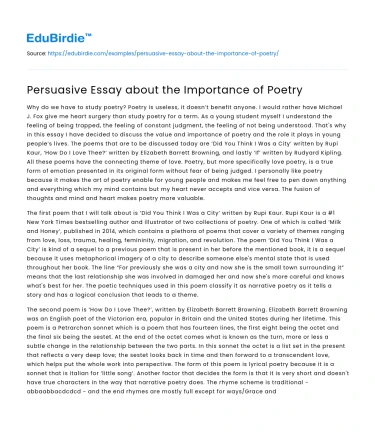Why do we have to study poetry? Poetry is useless, it doesn’t benefit anyone. I would rather have Michael J. Fox give me heart surgery than study poetry for a term. As a young student myself I understand the feeling of being trapped, the feeling of constant judgment, the feeling of not being understood. That's why in this essay I have decided to discuss the value and importance of poetry and the role it plays in young people’s lives. The poems that are to be discussed today are ‘Did You Think I Was a City’ written by Rupi Kaur, ‘How Do I Love Thee?’ written by Elizabeth Barrett Browning, and lastly ‘If’ written by Rudyard Kipling. All these poems have the connecting theme of love. Poetry, but more specifically love poetry, is a true form of emotion presented in its original form without fear of being judged. I personally like poetry because it makes the art of poetry enable for young people and makes me feel free to pen down anything and everything which my mind contains but my heart never accepts and vice versa. The fusion of thoughts and mind and heart makes poetry more valuable.
The first poem that I will talk about is ‘Did You Think I Was a City’ written by Rupi Kaur. Rupi Kaur is a #1 New York Times bestselling author and illustrator of two collections of poetry. One of which is called ‘Milk and Honey’, published in 2014, which contains a plethora of poems that cover a variety of themes ranging from love, loss, trauma, healing, femininity, migration, and revolution. The poem ‘Did You Think I Was a City’ is kind of a sequel to a previous poem that is present in her before the mentioned book, it is a sequel because it uses metaphorical imagery of a city to describe someone else's mental state that is used throughout her book. The line “For previously she was a city and now she is the small town surrounding it” means that the last relationship she was involved in damaged her and now she's more careful and knows what's best for her. The poetic techniques used in this poem classify it as narrative poetry as it tells a story and has a logical conclusion that leads to a theme.
Save your time!
We can take care of your essay
- Proper editing and formatting
- Free revision, title page, and bibliography
- Flexible prices and money-back guarantee
The second poem is ‘How Do I Love Thee?’, written by Elizabeth Barrett Browning. Elizabeth Barrett Browning was an English poet of the Victorian era, popular in Britain and the United States during her lifetime. This poem is a Petrarchan sonnet which is a poem that has fourteen lines, the first eight being the octet and the final six being the sestet. At the end of the octet comes what is known as the turn, more or less a subtle change in the relationship between the two parts. In this sonnet the octet is a list set in the present that reflects a very deep love; the sestet looks back in time and then forward to a transcendent love, which helps put the whole work into perspective. The form of this poem is lyrical poetry because it is a sonnet that is Italian for ‘little song’. Another factor that decides the form is that it is very short and doesn't have true characters in the way that narrative poetry does. The rhyme scheme is traditional - abbaabbacdcdcd - and the end rhymes are mostly full except for ways/Grace and use/loose/choose. The full rhymes bring closure and help bind the lines together.
The third and final poem I will be discussing with you today is ‘If’ written by Rudyard Kipling. Rudyard Kipling was an English journalist, short-story writer, poet, and novelist in the late 19th century. He was born in India, which inspired much of his work such as ‘The Jungle Book’. Kipling is regarded as a major innovator in the art of poetry, his pieces are regarded as classics of children's literature. ‘If’ is an inspirational poem that provides advice on how the reader should live one’s life. The poem takes the reader through many different ways in which the reader can rise above difficult or unpleasant situations that will almost certainly be thrown one’s way at some point in one’s life. Throughout the poem, the speaker gives the reader multiple scenarios, both positive and negative, along with a glimpse into how one should react. The poem has an almost mathematical proof about it with its if-then scenario. Kipling leaves the 'then' until the final two lines, “Yours is the Earth and everything that’s in it, And—which is more—you’ll be a Man, my son!”, revealing to the reader that if he or she is able to do all that was just mentioned, he or she will not only have the world at his or her fingertips but he or she will also be a 'Man'. The poem is divided into four stanzas of eight lines or otherwise known as quatrain. This poem is to be considered lyrical as it has the intention to teach the reader and it has a single speaker with an emotive tone.
In conclusion, I will assume my goal of convincing about the importance of poetry is completed. If the message was not clear, I will reiterate it. Poetry is important because it helps people understand and appreciate the world around us. Poetry's strength lies in its ability to shed a 'sideways' light on the world alight that is to be determined by everyone, so the truth sneaks up on you and can be different for everyone. When it comes to specifically love poetry and how it could affect high school students, there is no question about it. Poetry teaches us how to live.






 Stuck on your essay?
Stuck on your essay?

